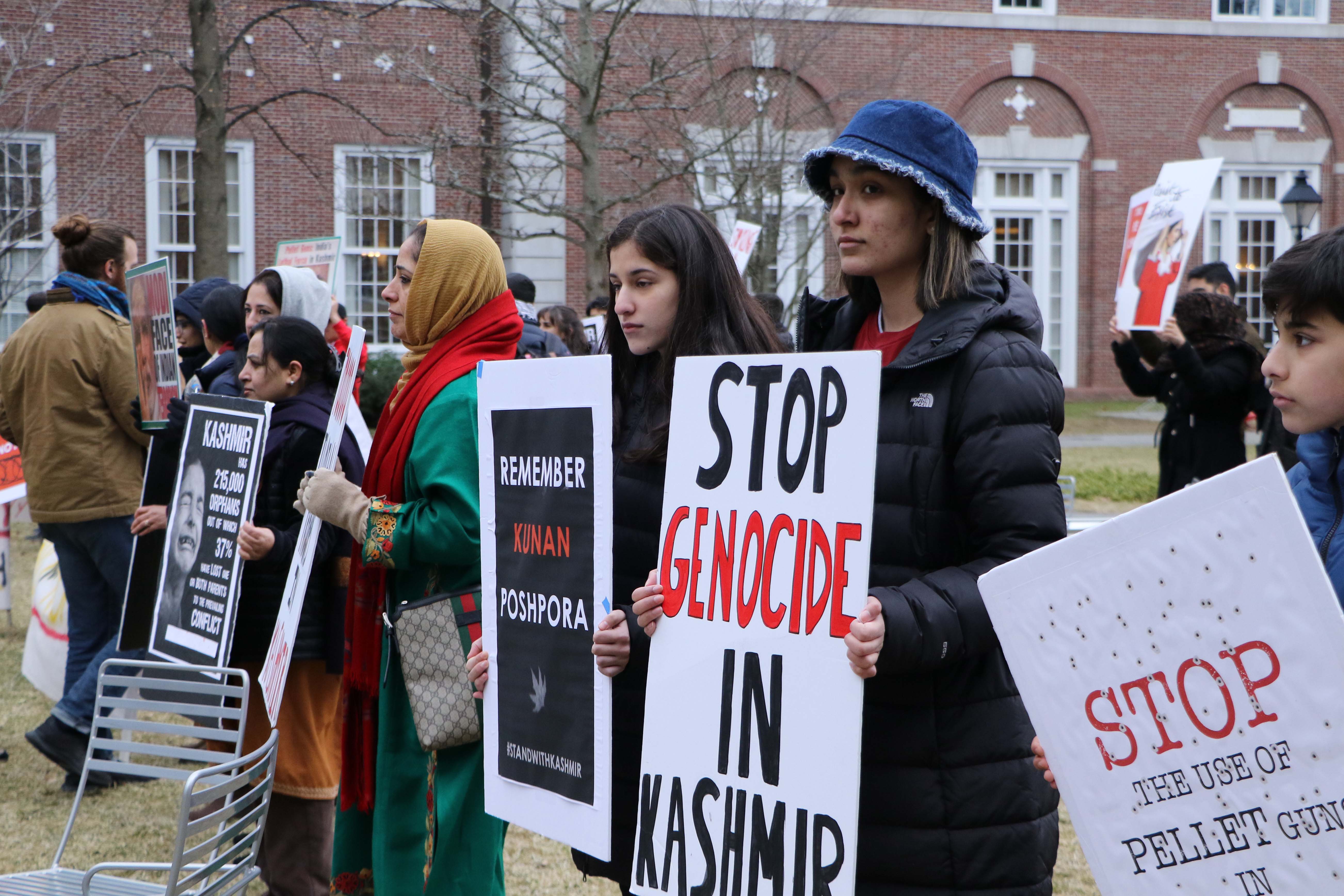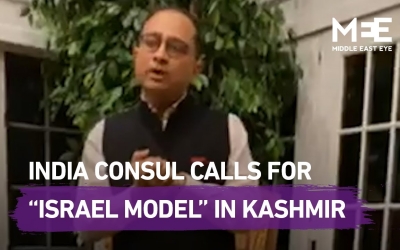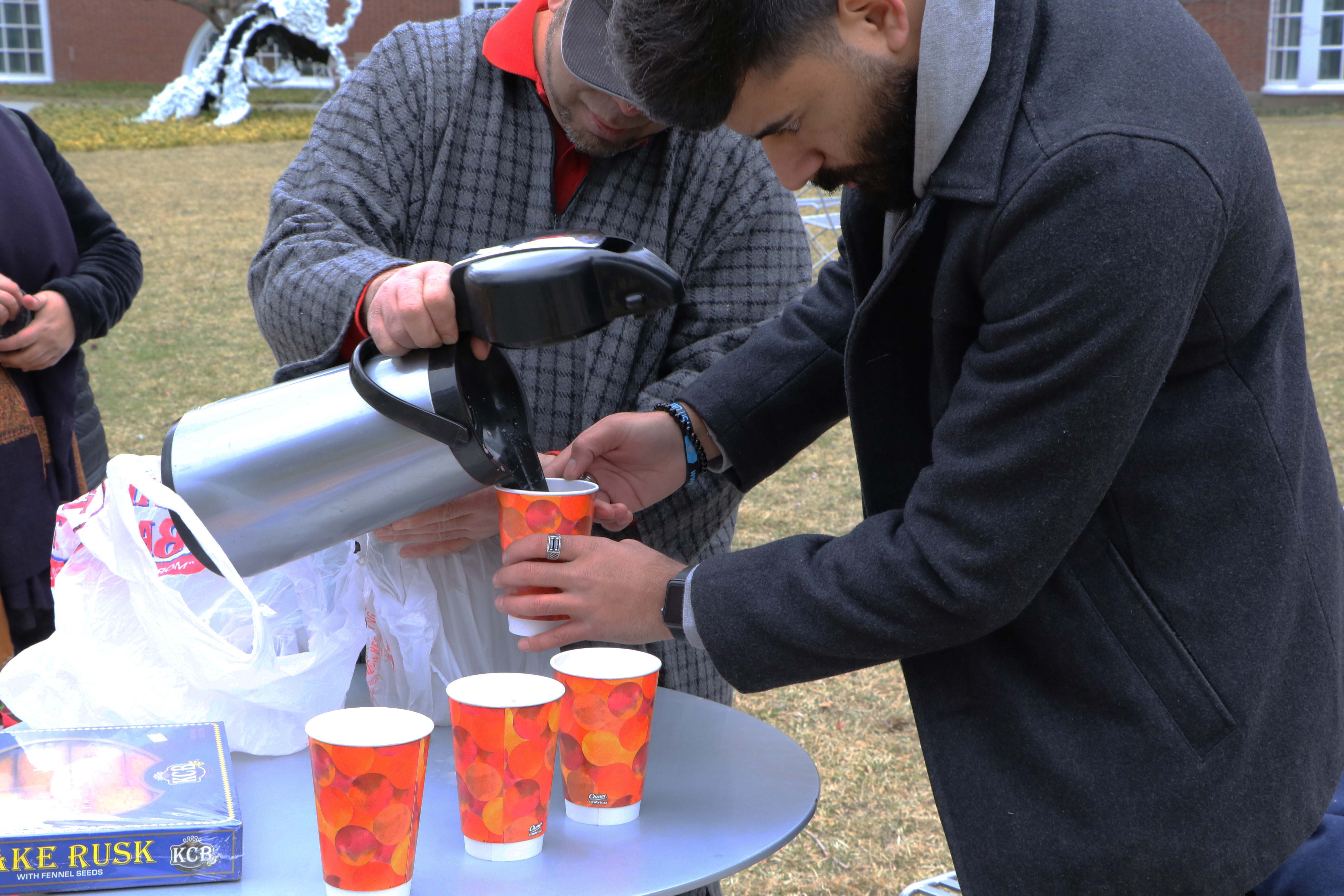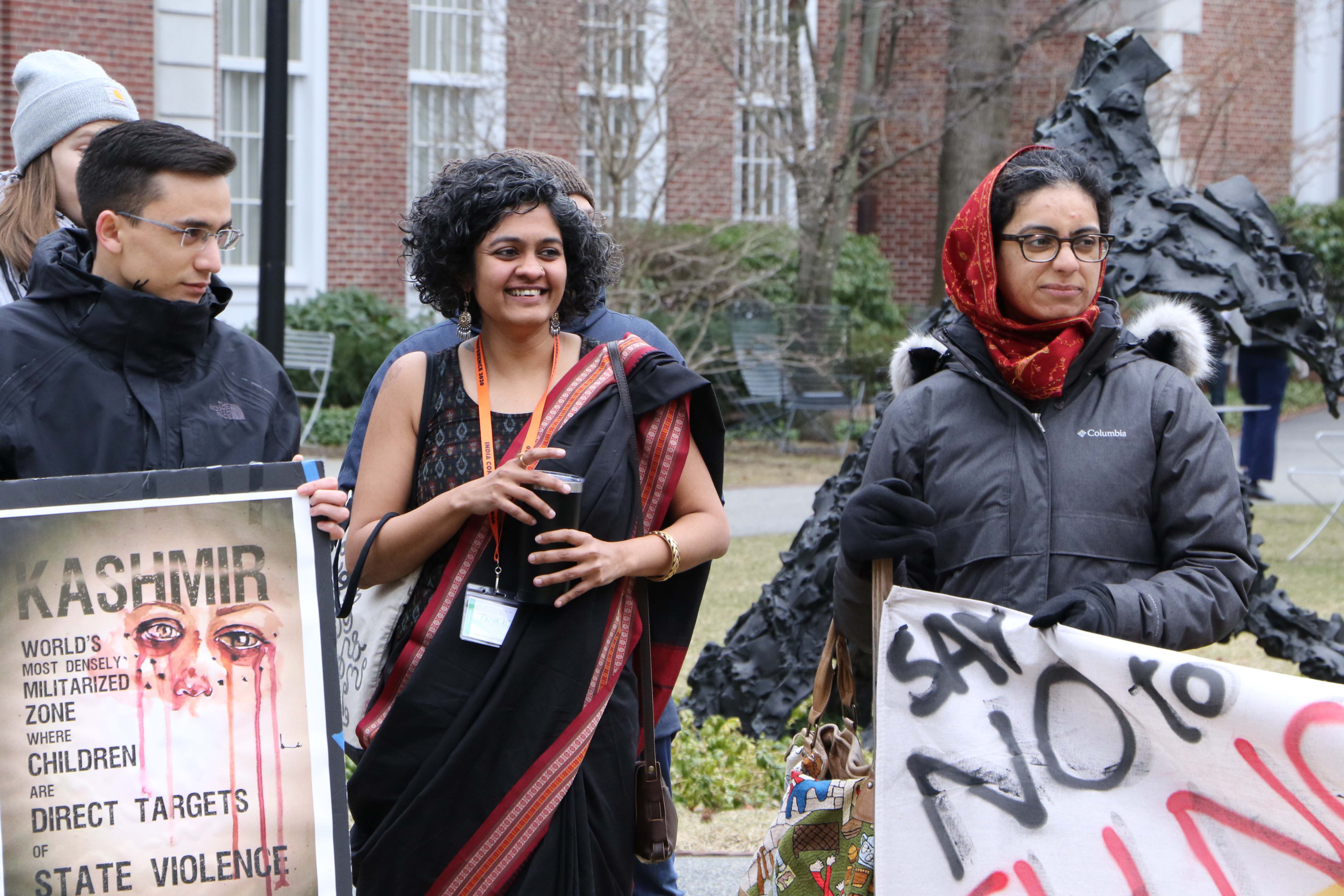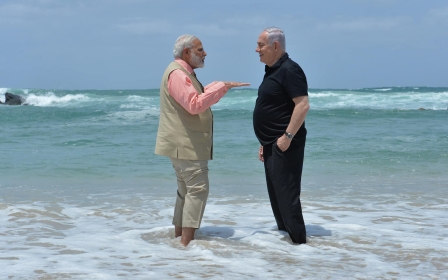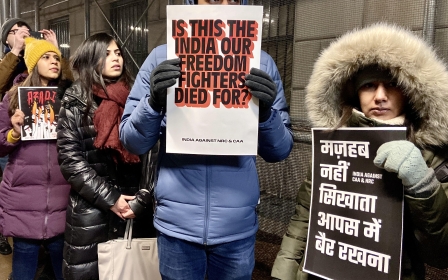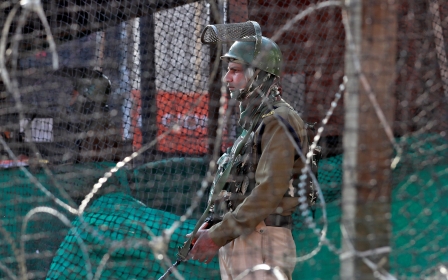Kashmiri and Palestinian activists stand against Indian envoy at Harvard
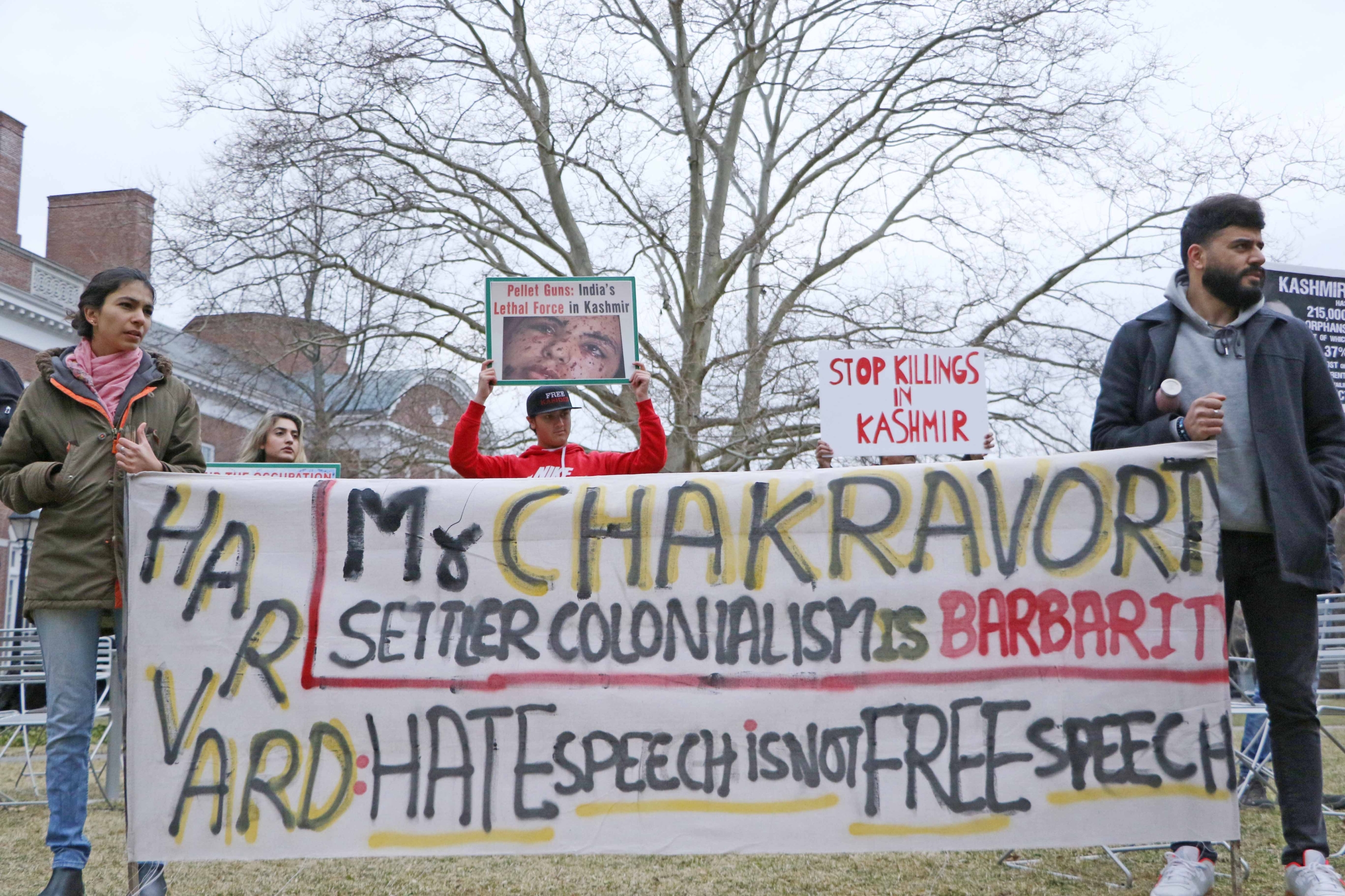
On a chilly Cambridge afternoon, a group of Kashmiris and Palestinian activists came together in solidarity for Kashmir and to protest against a talk by an Indian official at Harvard University.
The protesters gathered at Harvard Square in front of Aldridge Hall, where Indian envoy Sandeep Chakravorty was speaking, and set up banners reading "Stand With Kashmir" and "Settler-colonialism is barbarity".
In unison, they chanted for freedom:
Hum kya chaatai? Azaadi! Hai haq humaara. Azaadi! Pyaari, pyaari Azaadi! Mehki, mehki Azaadi!
(What do we want? Freedom! It is our right. Freedom! Lovely, lovely freedom! Sweet, sweet, freedom!)
Chakravorty is the Indian consul general in New York. He came under heavy criticism after he made comments urging Kashmiri Pandits, an ethnic group of Kashmiri Hindus, to create settlements on land owned by Kashmiri Muslims and compared that process to Israeli settlement building in the occupied West Bank.
"It has happened in the Middle East. If the Israeli people can do it, we can also do it," Chakravorty told Kashmiri Pandits and Indian nationals at a private event in New York City in November.
Israeli settlements in the West Bank have long been deemed illegal under international law.
The demonstration was joined by Kashmiris under the organisation Stand With Kashmir, a Kashmiri diaspora-driven grassroots group.
Other groups on campus also joined in, including some working on ending the Israeli occupation of Palestine, a cause often paralleled these days with the plight of Kashmiri Muslims.
On 5 August, the Indian government placed more than seven million people in Kashmir under a communication blackout and went on to illegally abrogate Article 370 of the Indian Constitution, effectively ending the state's semi-autonomous status.
"We look up to places like Harvard for everything, like academic excellence, and we look up to these institutions for their ethics, for what they stand for," one protester, who requested to remain anonymous, told Middle East Eye.
The protester went on to say that the institution's reputation is harmed when "they support panels like these, where a person calls for building Israeli-type settlements in Kashmir".
"They bring a person like him to speak and have no critical session on Kashmir, where for the last seven months people have had no communication," the protester added.
India's actions have drawn condemnation from US lawmakers and human rights groups and prompted two congressional hearings.
In December, the Indian government also passed the Citizen Amendment Act (CAA), which makes faith a basis for holding Indian citizenship.
Rights groups argue that the exclusion of Muslims violates India's secular constitution by making religion a basis for citizenship.
"Thank you for making it clear what the Hindutva fascist government in India wants in Kashmir," Miriam Alphonsus, a student with the group Harvard out of Occupied Palestine, said to the demonstrators.
"No longer can they claim that what they want is an era of development. What they want is an era of Hindu colonisation."
So far, two US cities have passed resolutions against India's CAA: Seattle, Washington, and Cambridge, Massachusetts, just last week.
Sultan Chaudhry, one of the participants, said he had grown despondent over the past 30 years, seeing Palestinians and Kashmiris both deprived of their rights and their lands. "It makes me very disheartened," Chaudhry told Middle East Eye.
Harvard's India conference
Chakravorty was appearing at a conference at Harvard University focused on India and its relationship with the United States.
The two-day conference was organised by Harvard students, according to its website, and is bringing top figures from India's business and political world to Cambridge.
Still, once they found out Chakravorty would be speaking, the Kashmiri organisers decided to write letters to try and stop it.
"This event does not support me," said Zarka Shaber, a Kashmiri student at Harvard Law.
"It's been six months since I left my home and haven't seen a single photo of my parents."
'Pyaari, pyaari Azaadi! Mehki, mehki Azaadi!'
- Chants from the protesters
The demonstrators sent letters outlining their complaints to multiple deans on campus, including the deans of Harvard's business school, the Kennedy School of Governance, and the dean of diversity.
The response was disappointing but expected. Some replies said they were allowing the event on the merits of free speech, but would pass on the message to the students putting the conference together.
"Hate speech is not free speech," Arshad Iqbal, one of the principal organisers of the demonstration, told Middle East Eye.
The conference has yet to respond to Middle East Eye's request for comment.
One Kashmiri protester, who requested anonymity, said that many people were aware of the Israeli lobbying presence in the American capital, but not so much of its Indian counterpart.
"What people aren't really aware of is the immense Hindu lobbyist group in America that often comes from a business sector that almost directly funds, not surprisingly, Trump and Modi," the protester said.
Ordinary people
As the demonstration began to wrap up, organiser Iqbal began pouring participants hot cups of Kashmiri tea, a pink milk-based tea that is traditionally taken with salt rather than sugar.
He was wearing a grey and black checkered Pheran - a traditional Kashmiri dress.
The hot beverage brought much-needed warmth to the demonstrators, many of whom had been standing in the cold for hours.
Iqbal is an average Bostonian. He has a career of design engineering behind him, designing specialised computer hardware, and most recently quantum circuits. By no means does he consider himself an activist.
And yet, since 5 August, he has been leading all of the rallies and demonstrations on Kashmir in the area.
Iqbal is among many Kashmiris in the greater Boston area who are not politically inclined, but have been forced to take a stand as the Indian government has increasingly encroached on the rights of their people.
"All ordinary people who are ordinary professionals, who just do their day jobs, they have to wake up to this and speak out because today it's me or him or some other person, and the next day it will be them," Iqbal told Middle East Eye.
While the rally began with a handful of people, it soon grew to about 60. And while the first response to the participants' chants of "Free Kashmir" was a conference-goer yelling "End Islamic atrocities!", after a half-hour or so the demonstration began to gain new followers.
"While there are a lot of things that I may not connect or agree with, I appreciate and acknowledge the fact that they have the right to express their dissent," said Ashwanath, one of the Indian conference participants. He did not give his last name.
"Whatever is happening in Kashmir, six months of lock-down is not democracy," he said.
As groups of conference participants exited the building and walked by the demonstration, some stopped to take photos. Some began to mouth the word azaadi (freedom) in unison with the chanters.
Two conference participants went so far as to join in and stand with the demonstrators.
"I was so heartened to see some of the people who were at this conference joining us; that tells you there must be something going on in India," Iqbal said.
"Indians are realising that the situation they are in with this regime, it's not leading them anywhere."
Middle East Eye propose une couverture et une analyse indépendantes et incomparables du Moyen-Orient, de l’Afrique du Nord et d’autres régions du monde. Pour en savoir plus sur la reprise de ce contenu et les frais qui s’appliquent, veuillez remplir ce formulaire [en anglais]. Pour en savoir plus sur MEE, cliquez ici [en anglais].


